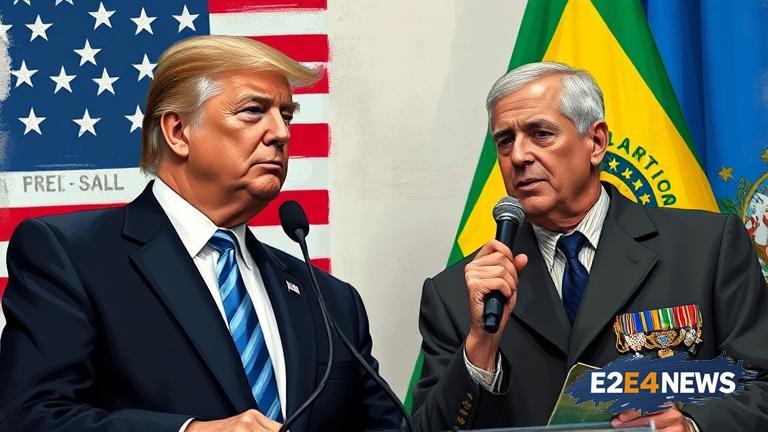The United States has imposed sanctions on a Brazilian Supreme Court justice, citing human rights abuses and corruption. This move has sparked a diplomatic fallout between the two nations, with Brazil’s government expressing outrage and disappointment. The sanctions, which were announced by the US Department of the Treasury, target the justice’s assets and impose a travel ban. The US government has stated that the sanctions are in response to the justice’s alleged involvement in human rights abuses and corruption. The Brazilian government has denied these allegations, stating that they are baseless and unfounded. The diplomatic row between the two nations has been escalating in recent months, with tensions rising over issues such as trade and security. The US has been critical of Brazil’s human rights record, particularly in regards to the treatment of indigenous communities and the suppression of dissent. Brazil, on the other hand, has accused the US of interfering in its internal affairs and imposing its own brand of democracy on the country. The sanctions have been met with widespread criticism in Brazil, with many viewing them as an attack on the country’s sovereignty. The Brazilian Supreme Court has also issued a statement condemning the sanctions and expressing its support for the targeted justice. The US has stated that it will continue to monitor the situation in Brazil and take further action if necessary. The diplomatic fallout between the two nations has significant implications for regional stability and cooperation. The US and Brazil have historically enjoyed a strong relationship, but recent tensions have put a strain on this partnership. The sanctions have also sparked a debate about the role of the US in promoting democracy and human rights around the world. Some have argued that the US has a responsibility to promote these values, while others have criticized the US for imposing its own brand of democracy on other nations. The situation in Brazil is complex and multifaceted, with a range of factors contributing to the current diplomatic row. The US and Brazil must work to resolve their differences and find a way to move forward in a positive and constructive manner. The sanctions have also had an impact on the Brazilian economy, with many businesses and investors expressing concern about the potential consequences. The Brazilian government has stated that it will take all necessary measures to protect its economy and sovereignty. The US has also been criticized for its handling of the situation, with some arguing that it has not done enough to engage with the Brazilian government and address its concerns. The diplomatic row between the two nations is likely to continue in the coming weeks and months, with significant implications for regional stability and cooperation. The US and Brazil must work to find a way to resolve their differences and move forward in a positive and constructive manner. The situation in Brazil is a complex and challenging one, and it will require careful diplomacy and engagement to resolve. The US and Brazil have a long history of cooperation and partnership, and it is essential that they work to preserve and strengthen this relationship. The sanctions have also sparked a debate about the role of the judiciary in promoting democracy and human rights. The Brazilian Supreme Court has played a crucial role in promoting these values, and the sanctions have been seen as an attack on the court’s independence and authority. The US has stated that it will continue to support the Brazilian Supreme Court and its efforts to promote democracy and human rights. The situation in Brazil is a complex and challenging one, and it will require careful diplomacy and engagement to resolve. The US and Brazil must work to find a way to resolve their differences and move forward in a positive and constructive manner.
